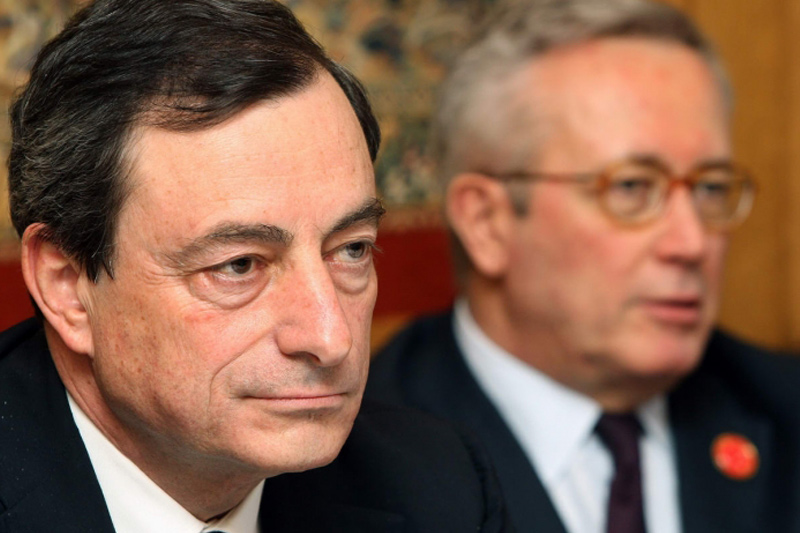By Eva Taylor
FRANKFURT (Reuters) - Expectations for further policy action at the European Central Bank's meeting on Thursday are running high after ECB President Mario Draghi pledged to use all available tools to keep prices in check.
But investors may be in for disappointment as resistance to quantitative easing (QE) remains stiff, particularly in Germany, while there is an increasing recognition that the ECB may not be able to solve Europe's problems alone.
Draghi told a central bank conference in Jackson Hole on Aug. 22 that financial market inflation expectations were falling significantly and the ECB would use "all available instruments needed to ensure price stability".
In a dramatic departure from debt-cutting orthodoxy, he also said there was scope for fiscal policy - more government spending - to play a greater role in reviving growth, an apparent acknowledgement of the limits of the ECB's powers.
German Chancellor Angela Merkel and Finance Minister Wolfgang Schaeuble were reported to have called Draghi seeking clarification and Schaeuble later said he had been "overinterpreted".
Either way, the ECB president's monthly news conference will be under minute scrutiny for signs that he is sticking to or diluting his Jackson Hole speech which departed from the text, leading some economists to believe Draghi had gone out on a limb as with his 2012 "whatever-it-takes" to save the euro speech.
Several economists now see a larger chance of the ECB embarking on QE in the coming months.
"QE is now largely unavoidable because inflation continues to persistently undershoot," said Citigroup economist Guillaume Menuet. He expects the ECB to announce such plans in December.
A Reuters poll put a 40 percent chance on the ECB conducting outright purchases of sovereign bonds by March next year.
Action on this front is unlikely on Thursday, though, and with the main interest rate at a record low 0.15 percent and the deposit rate below zero there is little scope for action there either.
The ECB is also waiting to see the impact of its new four-year loan programme. Under the plan announced in June, banks can take up to 400 billion euros in September and December, and even more next year if they keep lending into the real economy.
To start printing money now would be to acknowledge the failure of the long-term loans before they have even started.
Nordea analyst Jan von Gerich said: "I don't think they want to be seen panicking. And doing something other than a broad-based asset purchase programme, for example with the interest rates, would seem to make little sense."
NEW FORECASTS
The ECB's update of its economic projections will be key.
Disappointing euro zone growth data and inflation moving closer towards zero and further away from the ECB's target of close to 2 percent will likely prompt yet another downward revision of its staff forecasts on Thursday.
In June, it said inflation would only get back to 1.5 percent in the last quarter of 2016 compared with its March forecast of 1.7 percent.
The market-based inflation expectation rate Draghi cited in Jackson Hole - the five-year, five-year forward breakeven rate <EUIL5YF5Y=R> - has picked up since his speech.
On Monday, Draghi met French President Francois Hollande in Paris. An official in the president's office said they agreed deflation and weak growth were threatening Europe's economy.
The French government has consistently called for the ECB to do more to bring down the euro exchange rate to boost competitiveness. Over the last month, the euro has dropped from near $1.37 to around $1.31.
The ECB is already "moving fast forward" with preparations to buy securitised loans, Draghi said in Jackson Hole, and economists expect further details on a possible asset-backed securities (ABS) programme on Thursday.
"The easiest way for them would be to confirm that they've agreed to do ABS and that they are in the final stages of dotting the 'i's and crossing the 't's," said Citigroup's Menuet.
"I'm not sure they are willing yet to give us a number - I think that anywhere around 50 billion (euros) is the minimum they can announce, and perhaps that's the sort of intermediate stage they can agree on before spending the next three months building a QE strategy."
Others are not so sure.
With euro zone bond yields already at record lows, the impact of a QE programme could be limited while banishing any pressure on governments to pursue structural economic reforms.
"The ECB council will likely worry about the moral hazard aspects of QE, which could easily tempt governments in Italy, France and elsewhere to go even slower on reforms," Morgan Stanley analysts said in a research note.
QE remained a measure of last resort, they said.
(Additional reporting by Paul Carrel, editing by Mike Peacock)
